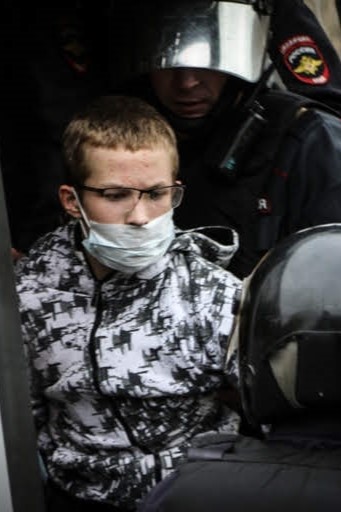Punishing all Russians for the crimes of Putin and his gang is not fair

Stáhnout obrázek
Andrei Karelin was born in St. Petersburg, Russia on 13 December 2002. His father was an archaeologist but sadly died when Andrei was 12 years old. Together with his younger brother and sister, they were brought up by their mother without a university education. Although sceptical of Vladimir Putin‘s regime, she did not dare publicly express her disapproval. Andrei believed the ideological massage at school, but later discovered the opposition activist Alexei Navalny. His ideas appealed to him, but at first he was afraid to participate in demonstrations. He first joined the protests on the day of Vladimir Putin‘s inauguration on 7 September 2018, when Navalny announced the action „It‘s not our car“. Later, he attended protests regularly and began working for Alexei Navalny‘s movement by distributing leaflets and conducting polls among people. He was detained by police about ten times, but in his teens he could only be held for three hours at most and had to be picked up by his mother. At first she did not like her son‘s activities, nor did the officials of the school that Andrej Karelin attended. After graduating in the summer of 2020, he worked with the SOTA Vision opposition website. In late October 2020, he travelled on his own to Belarus amidst protests to testify on the repression of demonstrators. He was detained and expelled from the country. In mid-December 2020, he enlisted for compulsory military service with an Air Force unit near his home, where he guarded an automotive equipment base. The service was disappointing to him. Until then he had believed the repeated thesis that the Russian army was strong and modern - but he had seen for himself that some of the equipment was only functional on paper, soldiers were wasting their time in pointless activities, and sloppiness and corruption were rampant everywhere. Andrei Karelin was discharged from service in December 2021, and he immediately joined the activities of the Vesna youth organisation. After the outbreak of the war in Ukraine, he was actively involved in protests and spent eight days in prison as a result. By that time, he was already in the crosshairs of the Interior Ministry‘s anti-extremist department, also known as Centre E, which is responsible for fighting opponents of the Putin regime. The officers pressured him to cooperate and eventually gave him a choice - either denunciation or a criminal record. He was given a day of free time to think about it, used it to escape to Turkey and from there, through a humanitarian visa granted by the Czech authorities, made his way to the Czech Republic. During his time with Memory of the Nation, he has worked in a refugee facility in Kostelec nad Orlicí and in a car parts factory, and in his spare time organized anti-Putin demonstrations in Prague.


































